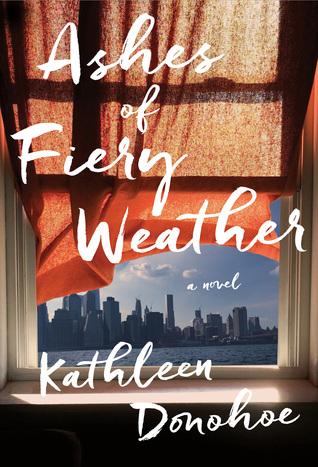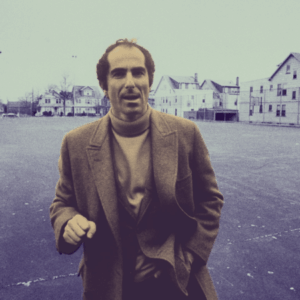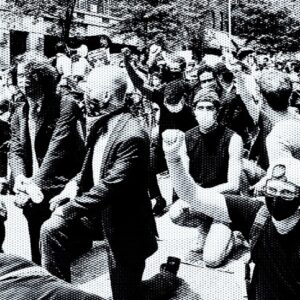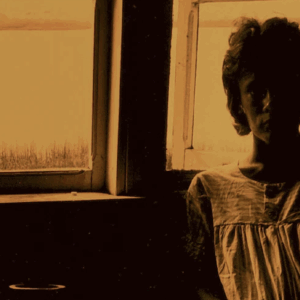December 1960
Eileen and Sean stood on the corner of Flatbush Avenue and Sterling Place in the crowd of onlookers. The tail of the plane was sticking up at an angle. UNITED, it said. The street was filled with debris from both the destroyed plane and the buildings it hit on the way down.
The freezing air smelled of smoke.
Eileen thought the street looked like pictures of London during World War II in her history textbook. Sean bounced on the balls of his feet. Eileen knew how badly he wanted to get closer, but the street was blocked off. They’d all heard the roar of the plane’s descent.
Eileen’s class had been doing math. Sean had been studying geography. Sean told her he’d just been asked to name the capital of Alaska when they heard the terrific roar from the sky. His teacher, a nun, had screamed, “Under your desks!” Eileen’s teacher, who was not a nun, covered her ears and ran to the window. Then, not long after, sirens started wailing. Fire trucks. Ambulances. On and on. Within the hour, the principal announced over the loudspeaker that a plane had crashed in Park Slope. She asked them to say a prayer for the passengers.
Some mothers had come to school to take their kids home. Eileen knew their mother, as a teacher herself, would not be able to. Her work- day didn’t end at three p.m. During the Christmas season, she worked Mondays, Wednesdays and Fridays, from four to eight, at the A&S on Fulton Street. Today was Friday. Eileen and Sean were supposed to go straight home, keep the doors locked, not answer the doorbell. They were supposed to call Nathaniel at the store if they needed anything while she was gone. In an emergency, dial 911. Do not call the firehouse directly. They might not be in.
The empty house never bothered Sean. Eileen, though, fifteen minutes before their mother was expected home, began sneaking peeks out the window when Sean wasn’t looking. She would not have been able to explain to him the enormity of her relief when she spied the slender figure coming slowly up the block.
But today, when they met by the schoolyard gate at three, Sean said he was going to get a look at the crash. Their neighborhood was be-tween Park Slope and Windsor Terrace. No way the Glory Devlins hadn’t responded. She could come with him or go home. She said she’d go with him, and he grinned.
They stood at the front of a small crowd, mostly other kids, some from this neighborhood and a few from Holy Rosary, who’d also walked or biked over.
Eileen held her coat collar closed with one gloved hand because she’d forgotten her scarf. The other hand was in her pocket. It had snowed this morning, enough to dust the ground. Nathaniel’s store, right across the street, was closed, so they couldn’t go in there to warm up. Eileen supposed this was one of those days when Nathaniel didn’t go to work. Usually he was open until six o’clock.
“The fires are out,” Sean said. “The smoke’s white. If it were black, that’d be bad.”
“There are body parts all over the street.”
Eileen turned to see John Maddox push past Ally Coen to stand behind her and Sean.
Ally regained his balance and stepped farther back. John was Sean’s age, thirteen, but they weren’t in the same class. He called Eileen Howdy Doody because of her red hair. Sean had fought him more than once. John always lost, but he was so dumb that he never seemed to remember this. Or so dumb that he thought he’d win the next one. Sean was always so pleased with himself for having defended her that she never told him she didn’t much care what the boys said about her. The boys would pick on you and the next minute let you play ball with them. The girls smiled when they said cruel things and they never turned kind.
You’re from Ireland, right? How come you don’t have a brogue? Where are your real parents? Are you an orphan? Is your hair the reason for your temper?
Temper. They were only repeating what the teacher said.
“Eileen O’Reilly, you have to learn to control your temper!” she’d shout when Eileen whirled around to shove a girl who pulled her hair.
She hated the girls. They were the reason for the “outbursts,” as the principal called them.
Two weeks ago, she had been shoved on the stairs by a girl from another class. She had turned, snatched the books out of the girl’s arms and tossed them over the banister.
Eileen had been suspended for three days. Her mother told her that when she felt herself getting angry she should count to ten. By the time she reached ten, she would be calmer. Eileen tried to explain that when she got mad, there was no time to count. For three days, she sat with Nathaniel in his store, listening to his stories of Poland before the war. He spoke of his teenage sisters, who were so pretty, boys waited outside their house to see them. He spoke of his little brother, who learned the names of flowers and trees from a book and had Nathaniel
take him on walks to look for them in life, refusing to listen when Nathaniel tried to explain that he was searching for things that didn’t grow in their village or anywhere in Poland. Eventually, Nathaniel kept quiet and let Miko search.
Sean looked at John, and Eileen could see him fighting the urge to shove him for shoving Ally, and the need to hear what he had to say.
“Body parts—who told you that?” Sean asked.
“My dad was there this morning,” John said. “There were shoes with feet in them. He almost puked.”
Eileen knew that John’s father was a cop. Probably he wasn’t lying.
Sean turned and looked back at the scene. He’d forgotten his hat, and his ears were bright red. Her neck, his ears. She hoped their mother didn’t find out about the scarf and the hat. Their mother was always saying they couldn’t afford pneumonia.
Eileen hunched her shoulders. So many firemen were walking around the wreckage that it looked like they were the only ones there, though she knew there were still cops working, because of all the police cars parked on Flatbush.
“The Glory Devlins are there too,” Sean said.
“Oh yeah?” John said. “And which one of them’s your real father?” Eileen flinched. She would never ask Sean, but she thought he probably did wish one of them was his dad. O’Brien and McAleer were his two favorites. Both of them were married, though, with kids older and younger than Sean. The guys who were still single were too much younger than his mother, who had turned forty-two in November.
Neither could recall when Delia first told them about Luke and how he left. They’d always known the story. Luke O’Reilly met a lady in England during the war and decided, after he’d been back in America a few years, that he would be happier with her. It was that simple, and they weren’t to make more of it and they weren’t to listen to the neighbors’ gossip. He was never coming back. Sean and Eileen were not to talk about the English lady.
When Sean was first due to start at Holy Rosary, their mother had said she and Sean’s father were separated. Unsatisfied with this answer, Sister Mary Alice, the principal, went to the monsignor. He had told the nun to let it be. Yet if talk of a divorce got around, parish gossip would force him to kick both children out of Holy Rosary. Then they’d have to go to public school. Eileen knew her mother didn’t care if they had religion as a subject, like math or English. She just thought Catholic school would keep them both out of trouble. But Sean had a theory about Luke. Maybe he was Eileen’s father too. Maybe he’d been a spy during the war and the Germans were still after him. He met the Englishwoman and the two of them had Eileen and then had to go on the run, so they sent her to America to be Sean’s sister. Eileen didn’t want the Englishwoman to be her real mother but she liked the idea of being Luke’s daughter, because that made her and Sean blood relatives.
Lately Sean had stopped telling the stories. Eileen tried to reignite his interest. Maybe the Englishwoman was a spy too. But Sean would shrug like it was a game he’d grown bored of playing.
Sean grabbed Eileen’s sleeve. “Come on. We can see better from over there.”
John didn’t follow them. Eileen had been hoping to go home. It was cold and would soon be getting dark. She stood shivering beside Sean, watching as two firemen carried a stretcher covered with a green blanket out of the middle of the street.
Sean nudged her. “That’s a dead body.”
Eileen turned away quickly and saw Amred Lehane standing behind a barricade, taking a picture. She tugged on Sean’s sleeve and pointed.
Sean looked, then called, “Amred! Hey!”
Amred lowered his camera and dropped the strap around his neck. As he walked over to them, he took a loose cigarette out of his pocket and lit it. He extinguished the match between his fingertips and dropped it on the wet ground.
“Whatta you hear?” Sean asked.
“Bad business,” Amred said. “ This plane collided with another that crashed out on Staten Island.”
“ That’s true?” Sean said. “All day we were hearing different stuff.
The teachers wouldn’t tell us anything except to pray for the boy who survived.” He pointed down the block. “Did anybody survive on the other plane?”
Eileen waited hopefully. The boy who lived was eleven years old. They’d taken him to Methodist Hospital. Her class, and she guessed all of the classes at school, had prayed for him and were told to do so again when they said their bedtime prayers. She and Sean didn’t say bedtime prayers, but tonight, Eileen might. The boy was burned. Burns, Sean had told her on their walk over, burns were bad. If you got burned deep enough, it didn’t hurt, but that meant real trouble. Your nerve endings were all dead.
Amred shook his head as he exhaled a stream of smoke. “No. They were all killed. But they got lucky—it went down in a field. Here, there are people missing from the neighborhood. They don’t got a number yet, or they’re not telling. I talked to Tommy Galton. He said two guys who were selling Christmas trees on the sidewalk are gone. Nobody in the apartment buildings so far.”
“Are they sure?” Sean asked.
“I don’t know. That’s the cops’ job. They’re talking to the residents, making sure nobody was caught in one of the fires. The caretaker of the church is dead. They know he was in there. Pillar of Fire Church. How about that?”
“How many companies responded?” Sean asked.
“No numbers yet. Mayor Wagner will be talking to the newspapers again tomorrow morning. Probably Commissioner Cavanagh too. It went to five alarms. They’re saying a hundred, two hundred off-duty firemen came in on their own. Heard and ran in. I’m thinking this is the biggest thing in Brooklyn since the theater fire in 1876.”
“Yeah? Wow.” Sean nodded, his eye fixed on the scene. “When did you get here?”
“About twenty minutes after it happened.” Amred patted his camera. “Were there body parts on the street?”
Amred dropped his cigarette on the sidewalk and ground it out. “Yeah. Everywhere. I don’t take pictures of that stuff. I’m no ghoul.”
Eileen scanned the scene. What used to be the plane now looked like chunks of garbage all over the street. It wasn’t good enough. She wished she’d been suspended from school this morning. She and Nathaniel would have heard the plane’s engine roaring, and they’d have run out of his store in time to see the plane hit the church and the church burst into flames. She wished she could have watched the whole thing, from its start to the terrible end. She didn’t want to see the deaths. She was no ghoul either. It was instead a need to know exactly how such a thing unfolded. Eileen wanted to be the plane itself and the boy who lived.
“I wasn’t asking that. Somebody said it. I was seeing if it was true,” Sean said.
“It’s true,” Amred said. “ The guys’re not stopping because of the dark. They’re bringing in lights.”
“But they don’t think there’s a chance anybody’s alive?”
“There can’t be,” Eileen said.
“You don’t know—” Sean started to say, but Amred shook his head.
“Eileen’s right. They’re staying for the dead.”
Then Amred said he was going to try to sneak into one of the nearby buildings to get some shots from the roof. He put his finger to his lips and slipped away.
The gray sky was getting darker. Eileen had given up holding her coat closed in favor of keeping both her hands in her pockets.
“Sean?”
“Huh?” He looked at her.
“Mom’s going to be home soon.”
“Yeah, yeah, I know. Let’s go. We can come back tomorrow.” He stopped. “Hey, I bet the Christmas party gets canceled.”
“You think so?” Eileen asked. The Glory Devlins company party was tomorrow afternoon. They were always invited. The last two years, Delia had sent them by themselves.
“The guys will probably all be here.”
“Well, maybe next Saturday.”
“That’s Christmas Eve, dummy.” Sean stopped walking.“Wait! That’s Hugh.”
Eileen saw the fireman coming toward them. Hugh McAleer.
“You two! Your mother’s looking for you,” Hugh called as he got close. Hugh had six kids, mostly boys, and one was in Sean’s class. The McAleers’ house was one of the places Sean went without her.
“Mom’s at work,” Sean said.
“She didn’t go in,” Hugh said. “The girls are at your house, mobilizing.”
“Mobilizing?” Eileen repeated.“ The girls,” she knew, meant the wives of the firehouse.
Hugh looked at her and his face lost the mad look.“Getting stuff together for the families who live here. Clothes, shoes.” He nodded over his shoulder. “Maureen and her just came down here with some of the stuff, and your mom asked me to look for you. They’re at the church on St. Johns.”
He recited directions: Go down Flatbush to Eighth Avenue. Make a right onto St. Johns Place. Walk all the way down the block. The church was on the corner.
“Get your tails over there,” he said.
“How’d she know we were here?” Sean asked.
“You kidding? Your mom’s no dummy,” Hugh said.“And Sean, listen, you should know better than to bring your little sister here. Something like this. Got it? Go on, go.”
Sean’s face was already raw from the cold, but even in the falling darkness, Eileen saw his color deepen. He hunched his shoulders and began walking so fast she had to nearly run to keep up.
Sean wiped his eyes on the cuff of his coat. Eileen looked away so he wouldn’t know that she’d seen him. She waited until they’d turned onto Eighth Avenue.
“What does he know!” Eileen said.“I’m not some little kid.”
“I know. But if I do come down here tomorrow, maybe you shouldn’t come with me,” he said.
Eileen stopped short but Sean kept walking. He noticed but pretended not to.
She ran a few steps to catch up and shoved him from behind. He stumbled and turned.
“I’ll wear a disguise,” she said.“I’ll hide my hair under a hat.”
Sean gave her an appraising look. “That could work.”
From ASHES OF FIERY WEATHER. Used with permission of Houghton Mifflin Harcourt. Copyright © 2016 by Kathleen Donohoe.













